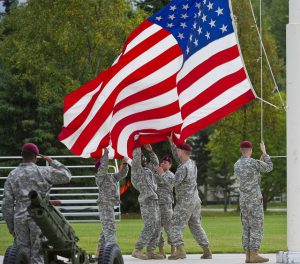
Flickr user Arctic Warrior
Searching for colleges and universities can be a hard enough process for students who have lived the majority of their lives in their high school’s town. For those students with family members who had to move constantly, the process is even more difficult. However, the adversity of having a parent (or parents) in the armed forces can give students an opportunity to shine. They have experiences that most students do not. And while the life of a military family can make the college search process difficult, there are ways to overcome that.
Talking About Your Military Family Experiences in College Essays
Colleges want to know what makes you unique. They want to see what has shaped your life and see your way of thinking. Being able to write about it effectively is going to give a clear map of your thoughts. You can write about the moves, the months or years your parent was overseas, living on military bases. You can write about things completely unrelated to military life, too. Maybe consider putting a spin on an essay topic: What wasn’t affected by your parent’s involvement in the military? What remained normal?
Again, you do not have to write about any of these topics. Which aspects of your life you decide to share is a personal choice.
Maintain Extracurricular Activities
Whether it’s playing sports, singing with the high school choir, or volunteering with the community, it’s important to find a way to involve yourself with other people. If you’ve been moving around because of a military parent, you can use these activities as proof of your ability to adapt to new environments. Colleges know it’s not always easy to keep up with activities when you move around. Even those students who remain in one place sometimes cannot keep committing the time required.
If you are interested in pursuing an activity on the collegiate level, start recording your progress early in high school. Make tapes of you playing your instrument, keep a portfolio of your art or writing, have someone record your sporting events: Anything that will show your skills and dedication is important. And this way, even if you move to the opposite side of the country halfway through high school or are stationed abroad, you still have something you can show college recruiters.
Talk To Your High School Guidance Counselor(s)
Guidance counselors or advisors in high school are there to help you figure out the college application process. Talk to them early, especially if you’ve had to move during high school. They can tell you what you need to know to graduate high school on time. In addition, they should be able to help sort out what classes you’ve taken and what else you need to take so that you don’t repeat anything and that you are placed at the appropriate level at your new school. This way, you can maintain your grades in spite of switching schools.
Study Early for the SAT/ACT
Almost every college and university in America looks at ACT and SAT scores as a way of judging college readiness. By studying for these standardized tests early, you increase your chances of understanding the questions being asked. This is particularly important concerning the math and science portions, as they have concepts and equations that are vital to performing well on the tests. Studying will help negate issues such as inadequate instruction or missing being taught a concept due to a move. It also gives you time to ask your high school teachers about concepts that are confusing.
College Talks
At some point, it’s important to have a chat with your parents about how your college experience will be financed, just as any other student would. If possible, talk to your parents face-to-face. This is important when you start looking into specific schools as well. What kind of school do you want to go to? Where are you looking to go? Will you consider attending a military school or joining ROTC? What kind of career do you think you want to have? Having an idea of where you want to go helps to ground you even if you move around.
As a Veteran Dependent
Many colleges offer special benefits to veterans and their dependents. Whether it’s more flexible class times, tuition discounts, or something else, it’s important to ask questions about your school. As an example, my college implemented a policy where out-of-state students who were dependents of veterans could be eligible for in-state tuition after providing the parent’s most recent deployment orders. I missed it the first year because I didn’t know to ask about any programs like that. Inquire into the Student Services office within your school, as they will likely have any information concerning military dependents.
There are also scholarships available specifically for military dependent students, such as this one here. Keep on the lookout for those during your senior year of high school!






